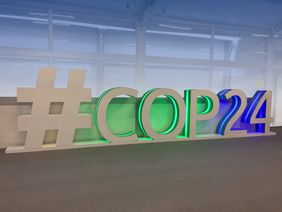Ecologic Institute's Events at COP24 – Review

At COP24 in Katowice (Poland), negotiators agreed on a rulebook for implementation of the Paris Agreement. During the talks various stakeholders presented and discussed diverse climate solutions at the side events. Ecologic Institute was represented at several side events and hosted two of them.
Side-event: Experiences with national and subnational climate laws: enhancing ambition
At the Academia Day of the Brazilian Pavilion, Dr. Camilla Bausch discussed the German climate protection strategy and the climate protection law expected to be adopted in 2019. Under the title "Experiences with national and subnational climate laws: enhancing ambition", guests from Brazilian NGOs as well as the LSE Grantham Research Institute and the Ecologic Institute were invited to share their experiences with climate change laws from various countries, including Germany, Great Britain and Mexico. These insights were then discussed in the context of current politics and climate action efforts in Brazil.
Side-event: Nature-based solutions and multi-level governance for carbon-neutral and resilient cities and regions
Together with ICLEI Europe the Ecologic Institute organised a side event on the potential of Nature-based solutions (NBS) to provide an integrated approach to climate change mitigation and adaptation – supporting the crucial role municipalities, cities and regional networks play in achieving the EU's long-term climate and energy objectives.
In a keynote speech, Ecologic Institute’s McKenna Davis presented the results of NATURVATION, a Horizon 2020 research and innovation project. The keynote focused on role of NBS as a tool to support climate targets, NBS support within current policy frameworks and potential for improving NBS uptake and governance (more information here).
Invited panelists, which represented local, regional, national and EU governance levels as well as civil society and research institutes, provided insights into the importance of innovative multi-level governance approaches, emphasizing the role of global and national governance levels as enablers of local-level action. The panelists shed light on the potential of grassroots activities and intensifying collaborative partnerships of local actors. The debate stressed that NBS could be used as a tool to jointly achieve climate, biodiversity and societal goals. It was indicated that NDCs (complemented by LDCs – Locally Determined Contributions) can provide an opportunity to integrate NBS into the climate and energy discourse and motivate national and local action. Finally, the need to integrate NBS into regulatory frameworks to support increased implementation was underlined.
Side-event: Momentum on Long-Term Climate Strategies: Where We Are in Europe?
At the side event, Matthias Duwe presented the results of the ClimateRecon2050 project on the status of the long-term climate strategies of EU member states (more information here).
Twelve EU Member States (MS) have already adopted national long-term climate strategies, and all the remaining MS are obliged to do so by January 2020. The already published long-term strategies differ greatly in their legal status, set targets and political ownership.
The invited panelists – representatives of ministries that have prepared the national long-term climate strategies of Estonia, Germany and Portugal – discussed the challenges and opportunities connected to the strategy preparation process. Drawing on their experiences and lessons learned, the panelists shared their advice for successful strategy preparation. The panelists emphasized the value of broad stakeholder dialogue and citizen consultation, and the importance of incorporating the gathered inputs and advice, and appropriately communicating the consultation process. Moreover, the policymakers pointed to the benefit of establishing an ambitious target first, and using it as a starting point to stakeholder discussion. Finally, the panelists indicated that involving highest office of the state in the strategy preparation process is essential to ensure coordination and buy-in into the strategy and its goals, across the government. The panelists commented on the role that the EU’s long-term climate strategy will play, especially as a strong signal on ambition levels and direction for the countries that are yet to formulate their strategies.
The recording of the event is available online.
This side event was organised by the Ecologic Institute together with the Association négaWatt and the Energiaklub.
Contact:Matthias Duwe (Ecologic Institute)
Further Links:
- UNFCC-Website: Katowice Climate Change Conference
- Momentum on Long-Term Climate Strategies: Where We Are in Europe? – Side Event from the Climate Recon 2050 Project at COP24
- Nature-based Solutions and Multi-level Governance for Carbon-neutral and Resilient Cities and Regions – COP24 Side Event
- Experiences with National and Subnational Climate Laws: Enhancing Ambition – Dr. Camilla Bausch at COP24 Side-Event
